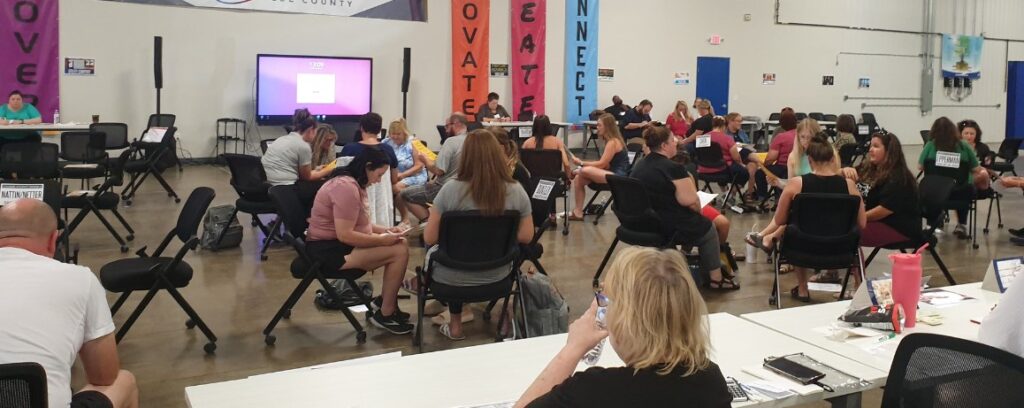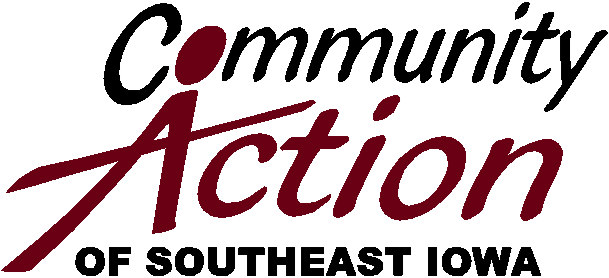
The Community Action Poverty Simulation is a profoundly moving experience. It moves people to think about the harsh realities of poverty and to talk about how communities can address the problem. Most importantly, it moves people to make a difference.
The poverty simulation experience is designed to help participants begin to understand
what it might be like to live in a typical low-income family trying to survive from month
to month. It is a simulation, not a game. The object is to sensitize participants to the realities faced by low-income people.
Participants assume the roles of up to 26 different families facing poverty. Some families are newly unemployed, some are recently deserted by the “breadwinner,” some are homeless, and others are recipients of TANF (Temporary Assistance for Needy Families, formerly AFDC), either with or without additional earned income. Still others are senior citizens receiving Disability or Retirement or grandparents raising their grandchildren. The task of the “families” is to provide for basic necessities and shelter during the course of four 15-minute “weeks.”
The simulation is conducted in a large room with the “families” seated in groups in the center of the room. Around the perimeter are tables representing community resources and services for the families. These services include a bank, super center, Community Action Agency, employer, utility company, pawn broker, grocery, social service agency, faith-based agency, payday and title loan facility, mortgage company, school, community health center, and child care center. Volunteers, preferably persons who have faced or are facing poverty, are recruited to staff the resource tables.
The experience lasts from two and a half to three hours. It includes an introduction, the actual simulation exercise, and a debriefing period in which participants and volunteer staffers share their feelings and experiences and talk about what they have learned about the lives of people in poverty.
Community Action of Southeast Iowa has partnered with Quad County Child Abuse Prevention Council (CPPC) in hosting local Poverty Simulations.
Community Action of Southeast Iowa Planning Director Rachel Albrecht and Quad-County CPPC Coordinator Arin Jones are trained facilitators through Missouri CAN who holds the copyright.
Pictures and Information:
- Facebook Pictures from the June 17, 2025 Poverty Simulation in Burlington
- Facebook Pictures from the April 29, 2025 Poverty Simulation in Burlington
- Facebook Pictures from the February 7, 2024 Poverty Simulation for the Fort Madison Community School District
- Facebook Pictures from the August 1, 2023 Poverty Simulation in Lee County Iowa
- Description with links and information.
Volunteers are a crucial role in facilitating the poverty simulation. They bring an array of experience to the simulation and are able to share their perspectives. Lee County Building Bridges Initiative and Burlington Building Bridges have partnered with us in organizing volunteers for simulations.
There is a debrief session at the end of the simulation to help participants share and process the experience.
Learn more about poverty simulations here: https://www.povertysimulation.net/
Or from the Missouri CAN brochure
Contact Arin or Rachel with general questions, about upcoming local simulations, or scheduling one for your group, business, or agency.
- Arin Jones: arinj@iastate.edu or 515-991-0299
- Rachel Albrecht: Rachel.Albrecht@caofseia.org or 319-753-0193
Poverty simulations need between 40-88 participants.
We currently do not provide training outside of Southeast Iowa. You can contact Missouri CAN about other trained facilitators in your area: (573) 634-2969 or povertysimulation@communityaction.org
If you are in Iowa, you can contact the Iowa Community Action Association (ICAA) about a training, or their facilitation of one, for your group or community. Contact Tiffany Keimig for more information, tkeimig@iowacaa.org
Handouts and information provided at recent poverty simulations:
- Roadmap of Child Welfare and Economic Support
- Key Findings about Economic & Concrete Supports
- History of the Poverty Simulation
- Facts about poverty
- Des Moines County – 4/25/2025
- Henry County – 8/9/2024
- Lee County – 7/24/2023
- Call to Action Handout – Community Action
- Call to Action Handout – CPPC
- Community Action Brochures – link
- County Resource Guides – link
- Walk through a short online simulation here as if you were in poverty with difficult decisions to make.
- Poverty is primarily the result of a failure at the structural level. Nowhere is this more apparent than in the lack of livable wage jobs for all who are in need of such work. The labor market simulator allows you to analyze the gap between the number of job seekers versus the number of livable wage jobs over the past 20 years, and who succeeds and fails in finding such jobs.

